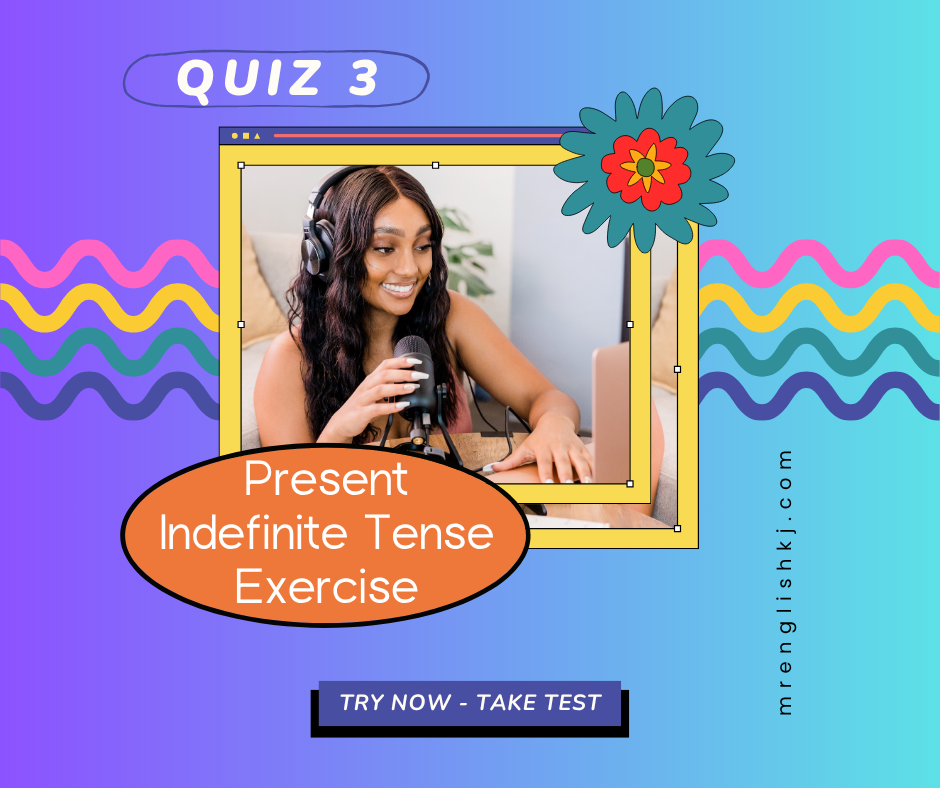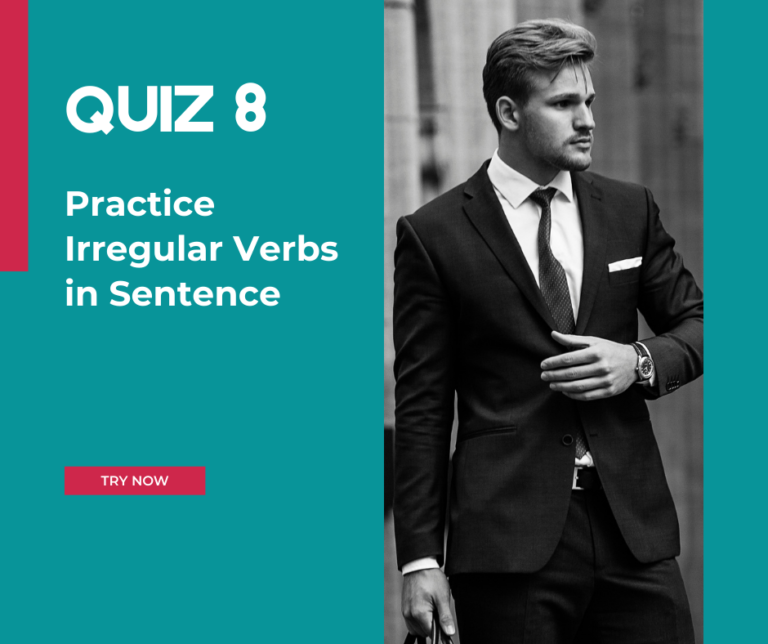
Present Indefinite Exercise 3 — Basic Present Simple Quiz
Welcome to Present Indefinite — Exercise 3, a short and friendly quiz for beginners. This practice set focuses on the Present Indefinite (also called Simple Present) tense — how we form it and when to use it. Each question has four choices and a full explanation so you learn not only the right answer but why it’s right. This is the first exercise in a series (Exercise 1, 2, 3 …) designed for steady improvement.
Short definition: Present Indefinite (Simple Present)
The Present Indefinite (Simple Present) describes habits, general truths, repeated actions, scheduled events, and states.
- Formation: base verb, verb 1st form, for I/you/we/they (e.g., I walk, they eat).
- Third person singular (he/she/it): add -s or -es on base verb (e.g., he walks, she goes).
- Use with adverbs of frequency: always, usually, often, sometimes, never.
- To learn more about Present Indefinite Tense – Visit Here
Quiz Instructions
- Read each question and choose the best answer out of four given options.
- On top, header section of the quiz, you will see the “title of the quiz,’ ‘spending-time,’ ‘value of question in points,’ and ‘number of questions.”
- Below on footer, you will see Full Screen mode. As the name suggests, it covers the whole screen. It will save a lot of your time attempting the quiz.
- You can zoom the images given in the questions.
- After submitting the quiz, you can see your score and compare with other users.
- The Full Leaderboard link will take you to a page, where you can see all users attempts.
- Below the quiz box, there are explanation of each options. You can study and try again.
- Best of Luck!
Quiz Question, Answer and Explanation
Note: Do remember in the quiz box above, the questions and options will shuffle, so they won’t have the same sequence like 1, 2, 3, or A, B, C as below.
1. He __ English very well.
A) speak
B) speaks
C) speaking
D) spoke
Correct: B) speaks
B correct — third person singular speaks.
A incorrect — base form wrong for he.
C incorrect — participle.
D incorrect — past tense.
2. I __ like tea.
A) not
B) do not
C) does not
D) is not
Correct: B) do not — (used with base verb: I do not like tea.)
B correct — first person negative uses auxiliary do not + base verb.
A incorrect — not alone is not the correct negative construction.
C incorrect — does not is third person singular only.
D incorrect — is not would require I am not; wrong structure.
3. Why _ she always _ late?
A) do, come
B) does, come
C) does, comes
D) do, comes
Correct: B) does, come — Why does she always come late?
B correct — question with third person singular uses does + base verb come.
A incorrect — do wrong with third person singular.
C incorrect — comes should not be used with does (auxiliary + base).
D incorrect — both wrong forms.
4. Our teacher __ us new words every week.
A) give
B) gives
C) giving
D) gave
Correct: B) gives
B correct — third person singular teacher uses gives for habitual action.
A incorrect — base verb wrong for third person.
C incorrect — participle.
D incorrect — past tense.
5. He __ tennis on Sundays.
A) play
B) plays
C) playing
D) played
Correct: B) plays
B correct — third person singular plays for habitual.
A incorrect — base form wrong for he.
C incorrect — participle.
D incorrect — past tense.
6. Cats usually __ at night.
A) hunt
B) hunts
C) hunting
D) hunted
Correct: A) hunt
A correct — plural subject cats uses base verb hunt.
B incorrect — hunts is third person singular.
C incorrect — participle.
D incorrect — past tense.
7. It often __ here in winter.
A) rain
B) rains
C) raining
D) rained
Correct: B) rains
B correct — third person singular it as weather subject uses rains.
A incorrect — base verb wrong for third person.
C incorrect — participle.
D incorrect — past tense.
8. We __ our homework every day.
A) does
B) do
C) doing
D) did
Correct: B) do
B correct — plural we uses base verb do.
A incorrect — does is third person singular.
C incorrect — participle.
D incorrect — past.
9. My brother seldom __ fast food.
A) eat
B) eats
C) is eating
D) ate
Correct: B) eats
B correct — my brother (he) uses eats for habitual negative adverb seldom.
A incorrect — base form wrong for he.
C incorrect — continuous implies now.
D incorrect — past.
10. They __ every Monday.
A) meets
B) meet
C) meeting
D) met
Correct: B) meet
B correct — plural they uses meet for scheduled/habitual action.
A incorrect — meets is third person singular.
C incorrect — participle.
D incorrect — past tense.



THANKS, VERY USEFUL.